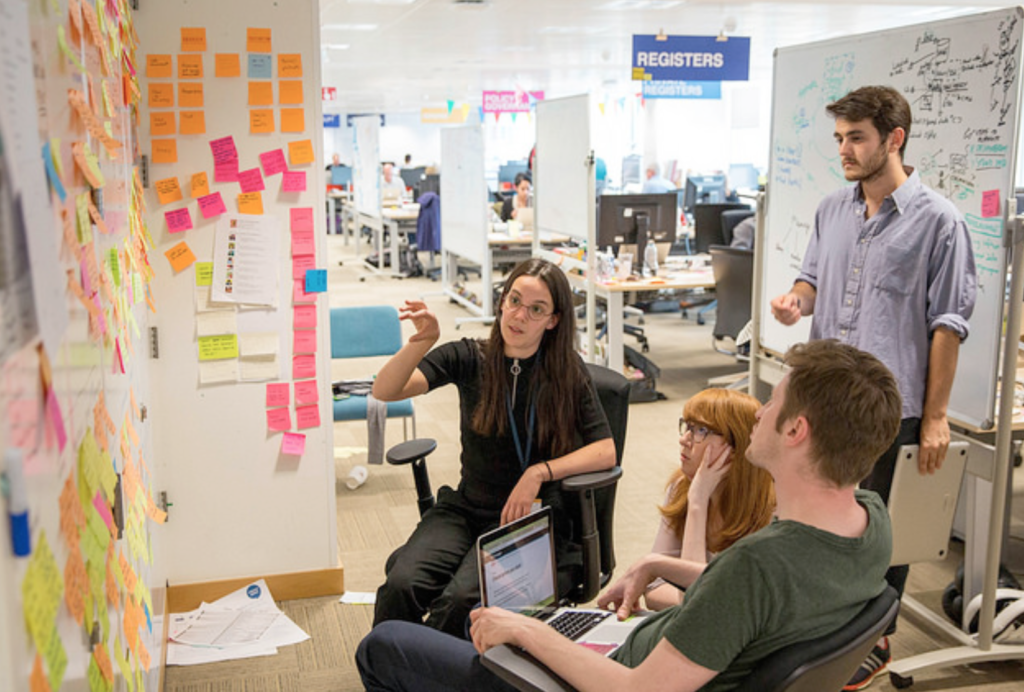One of the best parts of my role as an account manager is to get out of the office and spread the word about digital democracy. Last week, I was fortunate enough to return to my old stomping ground – Exeter University, in south west England – and give a talk to third year politics students. (The third year module on ‘civic engagement’ makes reference to online tools generally and Delib specifically.) It was a real delight to be there for the afternoon. I just wish the module had existed when I was at uni!

Whilst writing my presentation on ‘digital democracy in practice’, I was also able to reflect back on the changes in online consultation and digital in government from 2011 to now. I chose the end of 2010/start of 2011 as a starting point, as this is when Martha Lane Fox’s influential report on the revolution not evolution of directgov came out – a report which marked a bit of a sea change and the beginnings of gov.uk. This was also a useful reflection point for me as I started working at Delib a few months later!
One of the key changes I have seen since 2011 is a shift from one-off ‘singular (project-based) democracy’ which costs government thousands of pounds in websites/one-off builds towards more ‘continuous democracy’ in 2017. Government departments can now consult more regularly using low cost online tools. The result: more cost-effective solutions for citizens and improved transparency.
The second key shift I have witnessed is a more deep-rooted cultural change in working practices. Government departments are increasingly adopting more agile, lean and collaborative ways of working. Scenes that you see posted on gov.uk’s blog simply wouldn’t have existed in 2010.

Source: gds.blog.gov.uk
During the session, we reviewed some of the key grounding principles, focusing on the Gunning and consultation principles before applying these to real customer examples and teasing out some of the key challenges government departments face. I then opened up the session to questions. Here’s a flavour of the topics which came up from the students and an idea of how I answered them:
+ How does digital democracy help open up the conversation beyond ‘the usual suspects?’
Digital democracy can help open up the conversation to a broader range of participants by providing a different medium through which to conduct those conversations. Customers have indicated that using digital tools has enabled them to reach a broader audience group, which is fantastic. That said, if you are consulting a niche group on a specific topic, you may find that some of the ‘usual suspects’ still turn up, but who’s to say that they will be the only ones there contributing to the discussion?
+ How can social media help these conversations and government departments in 2017?
Social media can both promote and dilute the conversation you are hoping to have in my experience. If you start a conversation on one social media platform or digital engagement tool and it spreads across other platforms, sometimes the conversation can become disparate. It may also become difficult to analyse if there is no obvious flow or output from the discussions taking place. When used well, however, social media can be a great opportunity to get into spaces where these conversations are already happening or to open up participation to individuals interested people/groups.
In order to use social media effectively, civil servants need to be equipped with the right community management skills. Luckily, there are an increasing number of short, free courses opening up such as this one from Future Learn on using data from social media platforms to understand public conversations. I’m hoping to check the course out to help with the guidance we give our customers.
+ Are these methods inclusive or do they often exclude certain generations?
This topic also came up at a conference I recently attended called NotWestminster as we were working with a case study which featured retired users. It was interesting how quickly some of the group jumped to assumptions. I wouldn’t say that digital democracy excludes certain generations and the idea that the older generation not necessarily having strong digital skills isn’t always true. Often the blocker is confidence in digital which isn’t necessarily age-based. Where there are gaps (sometimes referred to as ‘the digital divide’), the UK government often looks to address them – for example, via setting up departments within GDS, such as the assisted digital team.
+ Do you find that government departments look at the cost-benefit analysis of running online consultation?
Some government departments that we work with are starting to drill into more of the details and nuances in this area, which is great to see. For example, we heard from BEIS at our 2016 London user group about working with statistics and conversion rates from gov.uk (they got from a 3% conversion rate to an impressive 25% by studying what worked well). BEIS are really hot on their analytics at the moment and I’m excited to see what they are going to do next.
+ Do you have plans to expand outside of English speaking territories?
Our current goal is to continue our expansion within English speaking territories. But it would be great to work in more countries around the world one day! Our main blocker to this is being able to translate all 3 applications (though it is something we’re looking at). Government structures are fairly similar in the countries where we work at the moment, but expanding to new countries always means learning more about the particularities of their context.
+ Where’s next for deliberative discussion?
So what will the next 5+ years hold? Well, the biggest challenges I see are around standardisation and sharing of best practice. This is perhaps not new or unique to online consultation but does hold one of the biggest opportunities in my opinion. Jodie Lamb, a Communication and Stakeholder Engagement professional recently posted about what she had learnt whilst working in New Zealand. Sharing best practice or having ‘hands across the ocean’ is key. If something has already been trialled in the UK and failed, then let’s ensure that digital teams in Australia and NZ learn from this. There are also some really exciting projects and learning opportunities coming out from countries like Iceland, Brazil and Estonia. Sharing best practice is key.
The future of government and effective online consultation lies in the hands of the next generation of digital leaders. Learning that modules like this one on civic engagement exist is really exciting. I’m hoping that this talk will pave the way to other opportunities to talk to young digital leaders in the future.